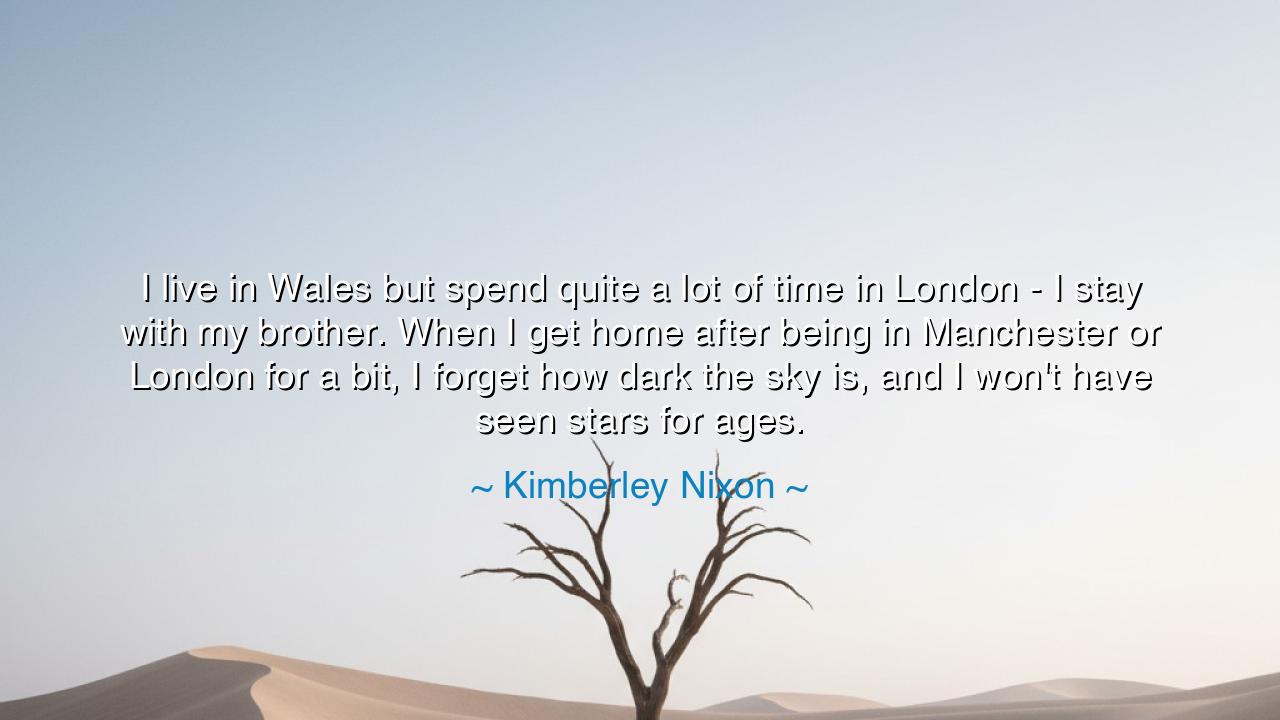
I live in Wales but spend quite a lot of time in London - I stay
I live in Wales but spend quite a lot of time in London - I stay with my brother. When I get home after being in Manchester or London for a bit, I forget how dark the sky is, and I won't have seen stars for ages.






In the ledger of journeys, some miles are measured not by footsteps but by the brightness overhead. “I live in Wales but spend quite a lot of time in London—I stay with my brother. When I get home after being in Manchester or London for a bit, I forget how dark the sky is, and I won’t have seen stars for ages.” Hear the soft ache inside these lines. They are a hymn to contrast: the hush of moor and mountain answered by the roar of avenue and train. The speaker names a forgetting and a remembering—the way city light thins the heavens, and the way returning teaches the eyes again to drink from the old well of night.
The ancients would recognize this pattern. They taught that every soul keeps two capitals: one of labor and one of wonder. In the first, we traffic in appointments and arrivals—London, Manchester, the spare bed at a brother’s flat. In the second, we dwell beneath a cathedral not made by hands—the dark sky whose choristers are stars. Too long in the market, and we begin to think the market is the world. Then, stepping back across the threshold of home, we notice that the ceiling of our days is vaster than the ceilings of our rooms.
To say “I forget how dark the sky is” is to confess how quickly the soul adapts to nearness and noise. Light pollution is a parable: false brightness that hides the truer blaze. Screens glow; constellations vanish. We learn the names of stations and lose the names of stars. But the dark that returns in Wales is not menace; it is medicine. It restores proportion—hills as giants by day; at night, ourselves as small and safe beneath a law of constellations older than our errands.
Consider a story fit for the telling of elders. A midwife of the borderlands—call her Eleri—rode by night when phones failed and roads narrowed to sheep paths. She navigated by Orion and the Plough, by wind and scent of rain. After a month assisting her sister in London, she returned and looked up, startled, as if greeted by relatives long absent. “I had forgotten their faces,” she said of the stars. Thereafter, even in the city, she kept a habit: at midnight she sought the dimmest alley and raised her eyes, counting the few that pierced the glare. The practice did not increase their number; it increased her gratitude—and guarded her from the city’s amnesia.
History echoes the same wisdom. When Wordsworth left the Lakes for the capitals, he carried fields and rivers in his chest; later he wrote to recover what cobblestones erode. Sailors once read the firmament as scripture: Polaris a nail holding the tent of night, the Southern Cross a compass for strange seas. Their craft was accuracy; their reverence was awe. We are no less in need. The itinerary may say Manchester, then London; the itinerary of the heart must also say: pause, look up, rejoin the choir that sings without microphones.
What lesson, then, do we inscribe for those who shuttle between brightness and brightening? Keep a double citizenship. In the city, let your brother’s door be hearth and your purpose be clear; in Wales, let the dark sky be school and your posture be humble. Refuse the lie that usefulness and wonder are rivals. The more you attend to the stars, the more gently you will handle the small things—keys, tickets, tired feet on late platforms—because you will remember their place in a cosmos that is not hurried.
Take actions simple and enduring. When you return home, step outside before you unpack; let your pupils widen; name one constellation aloud. On city nights, dim the room and open a window; listen for wind, for rain on stone. Keep a chart by the door and the number of a rural dark-sky park in your pocket; schedule pilgrimage as deliberately as meetings. Teach your friends the myth-lines of the sky so that even in the glare you carry star-knowledge like a talisman. Do this, and you will not forget again how dark can be tender, how distance can be bridged by looking up, and how a life lived between places can still keep one continuous horizon.






AAdministratorAdministrator
Welcome, honored guests. Please leave a comment, we will respond soon